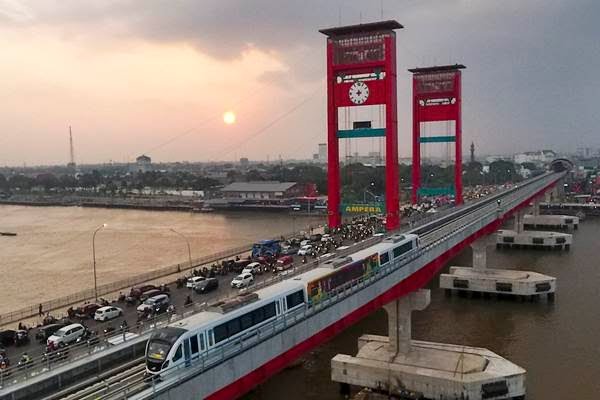Palembang has an environmentally friendly transportation system that needs to be developed in other cities. They have operated light rail transit (LRT) and bus rapid transit (BRT).
Minister of Transportation, Budi Karya Sumadi directly reviewed the connectivity and effectiveness of transportation in Palembang City, South Sumatra last September. From Sultan Mahmud Baddarudin II Airport, the Minister of Transportation tried the South Sumatra LRT train directly to the Jakabaring LRT station. Arriving at the Jakabaring LRT Station, the Minister of Transportation immediately took the Trans Musi bus.
After trying out this modern mode of transportation, the Minister praised the transportation connectivity efforts in Palembang City. “I directly tried urban transportation connectivity in Palembang, I see that both the LRT and the bus rapid transit (BRT) are quite well integrated. Earlier from the LRT station to the BRT shelter it was very close. Furthermore, we will continue to improve the effectiveness of the integration between these transportation modes. between one vehicle and another must work together,” said the Minister of Transportation.
Currently, Trans Musi BRT has three corridors which are implemented under the buy the service (BTS) scheme. The three corridors are the bus for the Alang Alang Lebar-Dempo Terminal, the Hajj Dormitory-Sako Terminal, and the Plaju Terminal-Jakabaring Main Station.
The BTS scheme is a scheme in which the government buys urban mass transport services to operators with an auction mechanism based on minimum service standards or quality licensing.
According to the Director General of Land Transportation, Budi Setiyadi, who also accompanied the Minister of Transportation in this activity, said that this year, one BTS scheme bus corridor will be added. The plan is for the Alang Alang Lebar-Talang Jambe Terminal route.
“We will provide one more corridor and we have auctioned it off to the Palembang City Government with the Alang Lebar-Talang Jambe corridor vehicle. we keep the headway between 10-15 minutes,” he said.
In a public dialogue, the Minister of Transportation, Budi Karya Sumadi supported the development of environmentally friendly transportation in big cities, such as Palembang, South Sumatra, which issued a number of policies to reduce air pollution or pollution.
In his opinion, air pollution is a global issue and very worrying world. “Palembang has a transportation system that is already good, if you add it to be environmentally friendly, it will certainly be even greater,” explained the Minister of Transportation, Budi Karya, who was delivered in a virtual public dialogue with the theme “Realizing Palembang City, the Oldest City in Indonesia with Good Air Quality through the Implementation of BBM Environmentally Friendly” held by the Indonesian Consumers Foundation (YLKI), on October 12, 2020.
The Minister of Transportation said that congestion that occurs in big cities is a major contributor to air pollution so that the government is very concerned about the development of integration between public transportation modes in Palembang to reduce this congestion.
This concern about the problem of air pollution is strengthened by the results of a study by the International Energy Agency (IEA) which states that poor air quality due to pollution causes 6.5 million deaths per year, the majority of which affect cities in Asia and Africa. This figure is expected to experience a drastic increase if there are no concrete steps to provide clean energy.
The land transportation sector in the form of private cars, motorbikes, and public transportation certainly contributes to air pollution and climate change. Moreover, with the use of low octane fuels such as Premium, climate change is accompanied by gas pollution that is harmful to health.
Seeing these problems, the Ministry of Transportation has increased measures that are pull policy such as increasing the availability of rail-based mass public transportation, increasing integration and also launching a BTS bus program in five major cities, namely Solo, Palembang, Medan, Denpasar and Yogyakarta and providing 45 bus units to serve three corridors.
BTS is a service buying system for urban mass transportation to operators with an auction mechanism based on minimum service standards or quality licensing. BTS buses have six service standards covering safety, affordability, safety, equality, comfort and order.
According to Budi Karya, the Ministry of Transportation has a number of strategic plans to implement energy diversification in the transportation sector, to reduce dependence on oil and gas imports, including through the use of biofuels (BBN) such as biodiesel for land transportation, BBG vehicles and electric buses.
The plan is that the application of BBN will be projected for heavy transport such as trucks and public transportation such as buses. Likewise with rail and electricity based transportation such as the MRT and LRT which are being developed in Jakarta and Palembang.
Anang Fadhilah






